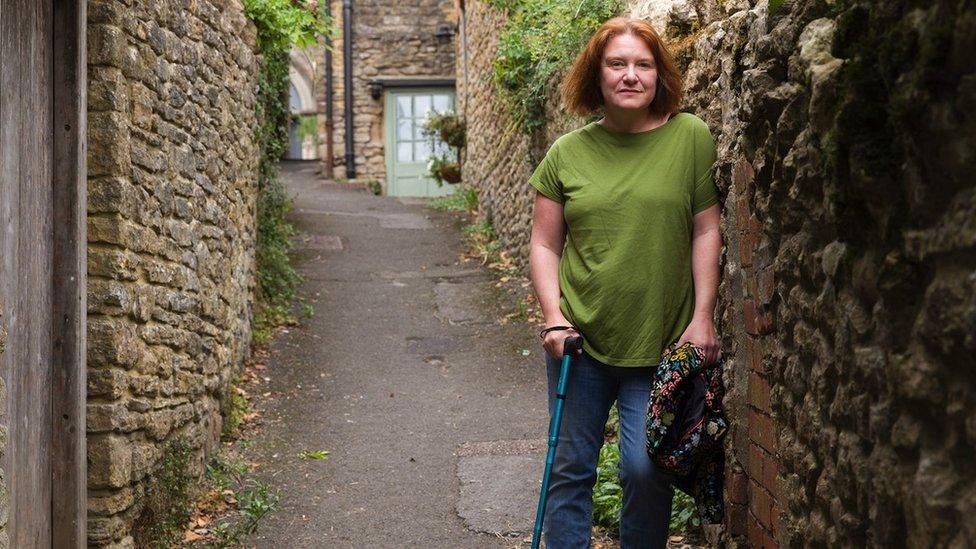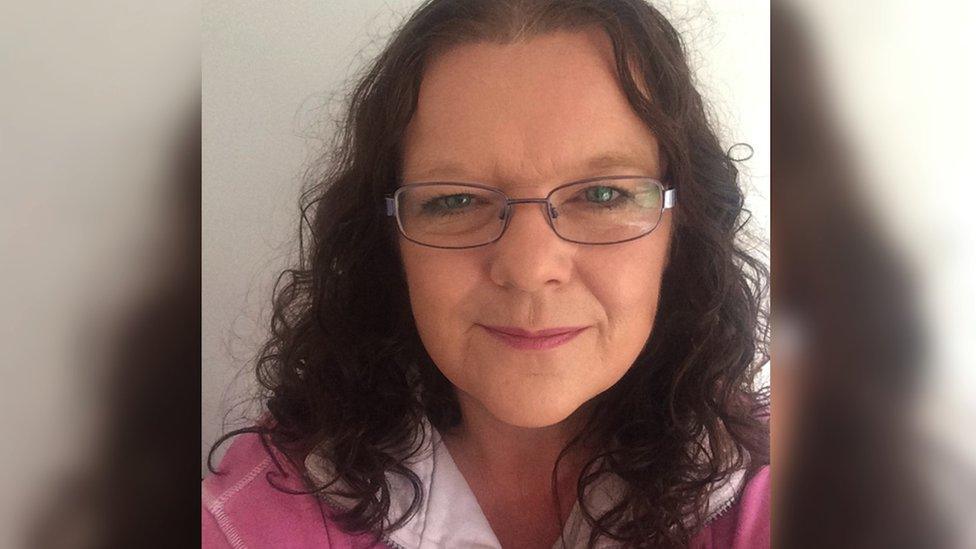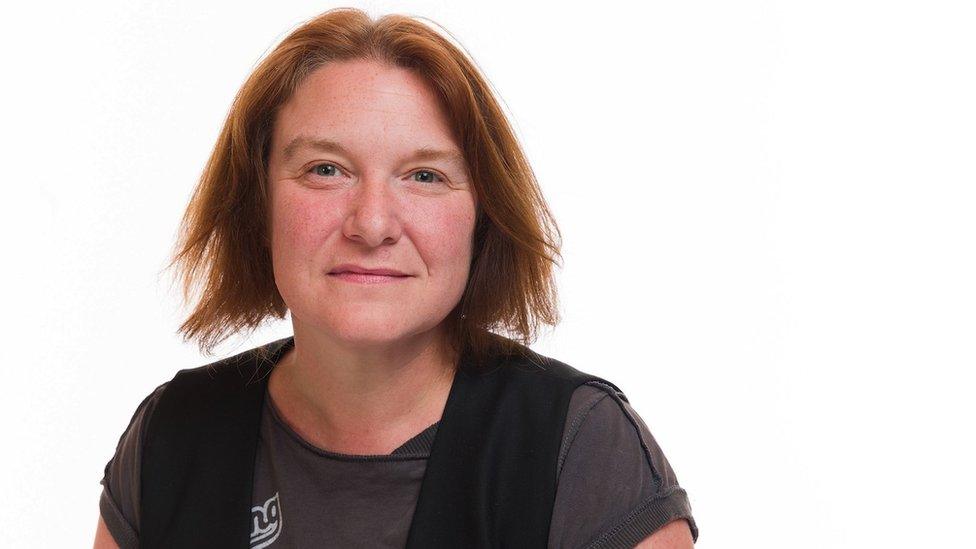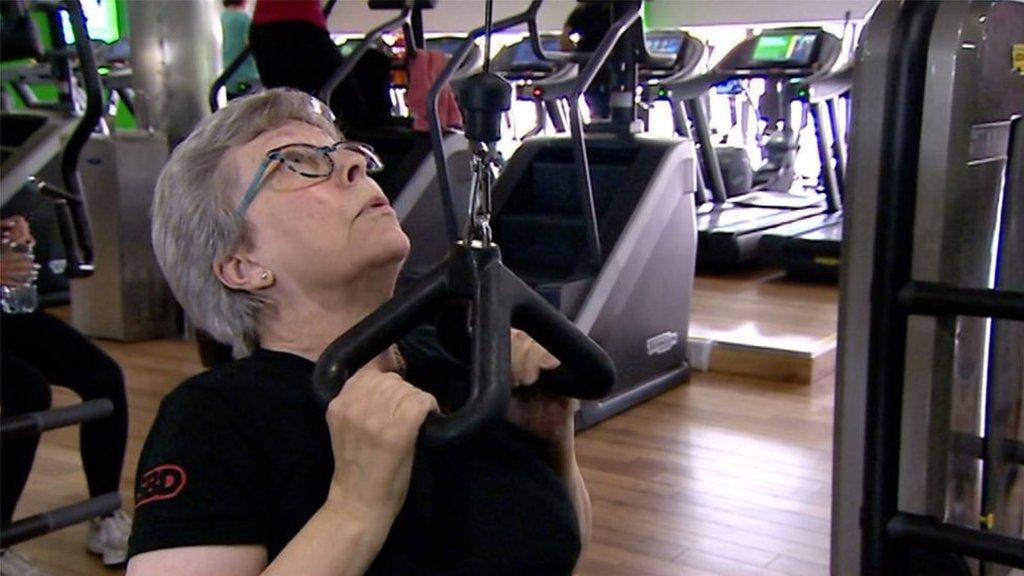Multiple sclerosis: Somerset women call for change to benefits criteria
- Published

Bethen Thorpe has appealed each of the three PIP assessments she has had
Two women with multiple sclerosis (MS) are calling for an overhaul of Personal Independence Payment (PIP) assessment criteria.
Bethen Thorpe, from Wells, and Julia Sealey, from Taunton, both have MS.
They said the current PIP system makes them "feel like a fraud or a liar" and the stress made their symptoms worse.
The Department for Work and Pensions said its disability assessors were health professionals and it aimed to provide a compassionate service.
Ms Thorpe and Ms Sealey have joined the MS Society to raise awareness of the condition and how it affects people.
Anastasia Berry, from the MS Society said: "Ten years of a broken PIP system has meant a decade of stress, indignity and humiliation for people with MS."

Julia Sealey said: “We’re in pain all the time"
PIP became the main disability benefit, external for people with disabilities, having replaced the Disability Living Allowance in 2013.
It is intended to help people living with the conditions such as MS to live a more independent life, by covering extra costs that their condition incurs.
However, the MS Society says a recent survey it carried out found that the PIP assessment process is having a "detrimental impact" on claimants, who say the criteria fails to take into account the varying degrees and unpredictability of the condition.
The survey found that almost 65% of people did not feel that their assessor considered symptoms such as pain, fatigue or cognitive difficulties.
More than 61% said their assessment report did not give an accurate reflection of their condition, and 72% of people said the assessment made them feel anxious.

Ms Thorpe struggles with household tasks and is often unable to go out due to her condition
Ms Sealey, 54, said: "Because MS has so many different symptoms, the people assessing you have to have more than just a basic understanding.
"You're made to feel like a fraud, a liar, like there's nothing wrong with you. It's belittling. I'm a strong person, but that made me feel stressed, upset and anxious.
"You're already feeling those things living with a lifelong condition - you have enough to deal with, but the PIP assessment just makes you feel even worse."
Ms Thorpe, who was diagnosed with relapsing MS in 2014, has undergone three PIP assessments and appealed all three outcomes.
The 47-year-old said: "I've had quite severe depression and my symptoms have worsened with the stress of PIP.
"I'm getting older - my MS is progressing. I don't know whether I can keep fighting it."

What is multiple sclerosis?
Multiple sclerosis (MS) is a lifelong condition that can affect the brain and spinal cord, causing a wide range of potential symptoms, including problems with vision, movement, sensation or balance.
The symptoms vary from person to person and can affect any part of the body.
Depending on the severity of the condition, symptoms may come and go or progress over time.
Source: NHS, external

Joe Brunwin, public affairs manager for the MS Society, said: "The conversations that we've been having clearly demonstrate the fact that the assessment process is in need of overhaul, which is why the MS Society's campaign is calling on the government to step in now after 10 years of failure with the PIP system and conduct a proper review for people with fluctuating conditions so that we can get this right once and for all."
A spokesperson from the Department for Work and Pensions said: "We support millions of disabled people every year and in the vast majority of PIP cases we make the right decision.
"We aim to provide a compassionate service and, where an in-person assessment is required, any claimant is free to be accompanied to their appointment to reduce stress or anxiety.
"All our disability assessors are qualified health professionals and we are investing in their skills as we improve the experience of the benefits system for disabled people."

Follow BBC West on Facebook, external, X, external and Instagram, external. Send your story ideas to: bristol@bbc.co.uk , external
- Published5 September 2023

- Published29 July 2023

- Published12 May 2023
- Published16 April 2023

- Published4 April 2023
